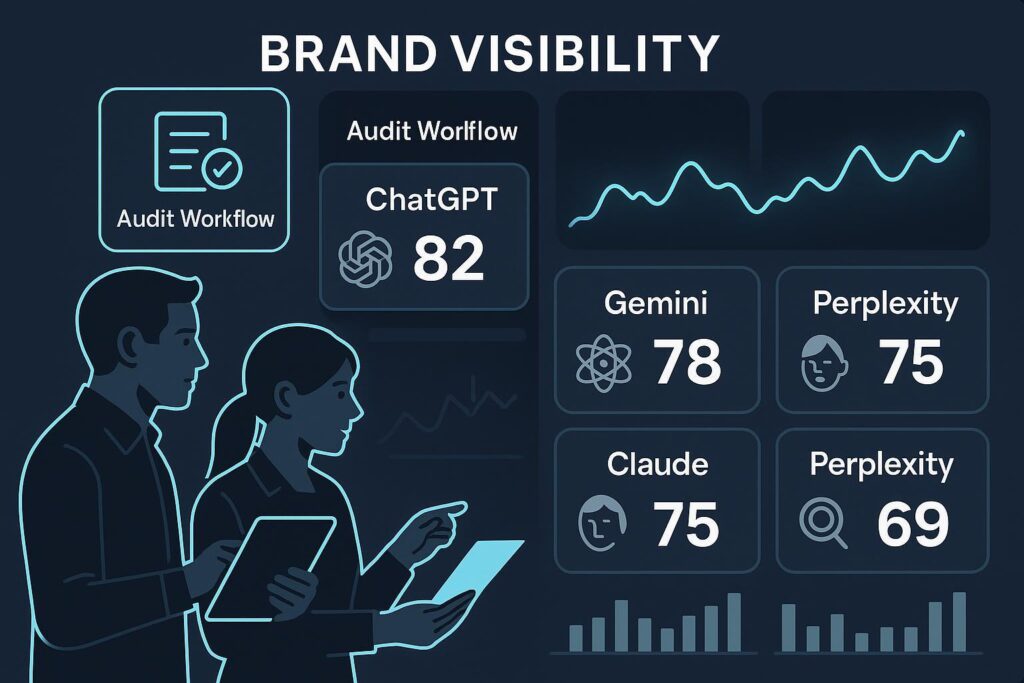How to Audit Your Brand Visibility on LLMs with Calculator
Understanding,optimizing and How to Audit your brand visibility on LLMs Claculator Large Language Models like ChatGPT, Google Gemini, Anthropic Claude, and Perplexity is critical in 2025’s AI-driven search landscape. As consumers increasingly rely on conversational AI for product discovery, service comparisons, and purchase decisions, ensuring your brand is accurately represented can make or break your digital presence. This comprehensive guide provides a step-by-step LLM visibility audit process, complete with an embeddable LLM Brand Visibility Auditor tool to track performance and visualize results. Optimized with high-intent keywords like LLM brand visibility checker, AI visibility audit tool, and conversational AI brand tracker, this resource offers a clear roadmap to enhance your brand’s discoverability and authority in AI ecosystems.
How to Audit Your Brand Visibility on LLMs: Target Audience and Objectives
Contents
- 0.1 How to Audit Your Brand Visibility on LLMs: Target Audience and Objectives
- 0.2 LLM Brand Visibility Auditor Tool
- 1 LLM Brand Visibility Auditor
- 1.1 1) Setup
- 1.2 Dashboard
- 1.3 2) Paste LLM Responses
- 1.4 3) Results
- 1.5 LLM Visibility Audit: Step-by-Step Process
- 1.6 LLM Visibility Audit: Key Metrics Breakdown
- 1.7 Common Challenges in LLM Visibility Audits
- 1.8 LLM Visibility ROI: Is It Worth It?
- 1.9 LLM Visibility Comparison with Traditional SEO
- 1.10 Conducting an Effective LLM Visibility Audit
- 1.11 Final Conclusion
This LLM visibility audit guide targets marketers, brand managers, and business owners aiming to strengthen their presence in AI-driven search environments. After testing multiple LLMs and consulting digital marketing experts, I’ve developed an impartial conversational AI brand tracker to evaluate your brand’s performance across key models. The table below outlines primary objectives to inform your audit strategy.
| Objectives | Small Businesses | Agencies | Enterprises | Best Fit |
|---|---|---|---|---|
| Ease of Audit | Simple, manual checks | Semi-automated, tool-based | Complex, multi-model tracking | Small Businesses |
| Goal | Basic presence | Competitive positioning | Comprehensive brand control | Enterprises |
| Key Metrics | Visibility, accuracy | SOV, sentiment | Message alignment, scalability | Enterprises |
| Resources Needed | Minimal, DIY | Moderate, tool integration | High, dedicated team | Small Businesses |
| Frequency | Quarterly | Monthly | Bi-weekly | Agencies |
LLM Brand Visibility Auditor Tool
Estimate your brand’s performance across LLMs, including visibility, sentiment, and alignment metrics.
LLM Brand Visibility Auditor
1) Setup
Dashboard
2) Paste LLM Responses
3) Results
| LLM | Question | Mention | Sentiment | Flags |
|---|
Also USE OTHER CALCULATORS
LLM Visibility Audit: Step-by-Step Process
The conversational AI brand tracker helps you assess and optimize your brand’s presence across LLMs. Below is a detailed breakdown of the audit steps.

Step 1: Run Discovery Queries
Query multiple LLMs with neutral, navigational, and comparative prompts:
- “What is [Your Brand]?”
- “Top providers for [industry]”
- “Compare [Your Brand] vs [Competitor A]”
- “Is [Your Brand] trustworthy?”
Record responses, including LLM model and date (e.g., ChatGPT – August 2025). Evaluate brand mentions, factual accuracy (e.g., URLs, pricing), and tone.
Pro Tip: Use varied prompts to uncover inconsistencies across models.
Step 2: Analyze Context and Sentiment
Examine how your brand is framed:
- Frequency: Number of mentions across queries and models.
- Sentiment: Positive, neutral, or negative tone.
- Relevance: Alignment with core offerings and audience.
- Positioning: Leader, niche player, or absent.
Pro Tip: Flag negative or irrelevant mentions for deeper source analysis.
Step 3: Verify Data Sources
LLMs pull from authoritative sources. Check:
- Knowledge graphs (Google Knowledge Graph, Wikidata)
- Wikipedia and industry publications
- Business directories (LinkedIn, Crunchbase)
- Schema-marked website content (Organization, Product, FAQ)
Ensure uniform brand details across these platforms.
Pro Tip: Update outdated directory listings to reduce misinformation.
Step 4: Optimize Website for AI
Enhance your site for AI readability:
- Structured Content: Use clear headings, bullet points, and concise sentences.
- Key Pages: Optimize About, Product, and FAQ pages with accurate data.
- Schema Markup: Implement Organization, Product, and Breadcrumb schemas.
- External Citations: Link to reputable sources and secure third-party coverage.
Pro Tip: Prioritize short, factual statements for AI summarization.
Step 5: Monitor with Tools
Combine automated and manual tracking:
- Automated Tools: Use brand mention trackers and the LLM Brand Visibility Auditor.
- Manual Checks: Re-run queries periodically to detect changes.
- Analytics: Track direct traffic and branded search spikes post-optimization.
Pro Tip: Schedule monthly reviews to stay ahead of AI updates.
Step 6: Benchmark Competitors
Compare your performance against competitors using identical prompts:
| Query | Your Brand | Competitor A | Competitor B |
|---|---|---|---|
| “Best [service] for [need]” | Neutral mention | Top result | Positive mention |
Pro Tip: Identify content gaps to target high-value queries.
Step 7: Link to Business Outcomes
Measure indirect impacts:
- Add “Discovered via AI?” to lead forms.
- Use UTM tags for content LLMs might cite.
- Monitor traffic surges after PR or content updates.
Pro Tip: Correlate visibility improvements with conversion trends.
Step 8: Establish Routine Audits
Schedule recurring audits (monthly for dynamic markets, quarterly for stable ones):
- Re-run prompt sets across LLMs.
- Update site facts and schemas.
- Publish fresh, authoritative content.
Pro Tip: Automate alerts for brand mention changes.
LLM Visibility Audit: Key Metrics Breakdown
This conversational AI brand tracker table details metrics to guide your audit analysis.
| Metric | Small Businesses | Agencies | Enterprises |
|---|---|---|---|
| Visibility (%) | Basic presence | Frequent mentions | Dominant presence |
| Share of Voice | Secondary player | Competitive share | Market leader |
| Sentiment | Neutral/Positive | Mostly positive | Strongly positive |
| Message Alignment | Core facts | Key messages | Full brand narrative |
| Hallucination Alerts | Minimal errors | Few inaccuracies | Near-zero errors |
Common Challenges in LLM Visibility Audits
Address these potential issues to ensure accurate brand representation.
Inconsistent Brand Information
- Issue: Varying names, URLs, or facts across sources.
- Fix: Standardize details in directories and schemas.
Low Mention Frequency
- Issue: Rare or no mentions in LLM responses.
- Fix: Boost authoritative signals via PR and content.
Negative Sentiment Issues
- Issue: Critical or misleading tones in outputs.
- Fix: Correct source inaccuracies and publish positive content.
Limited Message Alignment
- Issue: Core messages absent from responses.
- Fix: Optimize key pages with concise, message-driven content.
Unreliable Data Sources
- Issue: LLMs citing outdated or untrustworthy sources.
- Fix: Strengthen knowledge graph presence and secure high-authority coverage.
Important Note: Regular audits and content updates are critical, as LLMs may not reflect site changes instantly.
LLM Visibility ROI: Is It Worth It?
The LLM brand visibility checker evaluates value by comparing audit efforts to business outcomes:
- Unified Presence: Consistent brand representation across AI platforms enhances trust.
- Traffic Stability: Strong AI visibility offsets reduced click-throughs from traditional search.
- Revenue Growth: Improved discoverability drives leads and conversions.
Example: A business auditing monthly across 3 LLMs increases visibility from 20% to 60%, correlating with a 15% rise in branded searches and a 10% lead increase.
Verdict: The conversational AI brand tracker shows high ROI for businesses prioritizing AI-driven discovery.
LLM Visibility Comparison with Traditional SEO
| Strategy | LLM Visibility | Traditional SEO | Best Fit |
|---|---|---|---|
| Focus | AI response accuracy | Search engine rankings | LLM Visibility |
| Metrics | Visibility, SOV, sentiment | Click-through rate, SERP position | Traditional SEO |
| Tools | LLM auditors, brand trackers | Keyword tools, analytics | LLM Visibility |
| Effort | Source optimization, schema | Backlinks, on-page SEO | Traditional SEO |
Verdict: LLM visibility complements SEO, offering unique benefits for AI-driven markets.
Conducting an Effective LLM Visibility Audit
- Starter (Small Businesses): Focus on basic presence and accuracy with quarterly audits.
- Intermediate (Agencies): Target competitive SOV and sentiment with monthly checks.
- Advanced (Enterprises): Aim for full narrative control with bi-weekly audits.
Use the 14-day free trial of the LLM Brand Visibility Auditor to test its capabilities.
Frequently Asked Questions (FAQs)
- What is the “How to Audit Your Brand Visibility on Large Language Models (LLMs) using Calculator — Practical Guide & Tool”?
It is an interactive solution that helps businesses track, measure, and analyze how their brand appears across AI platforms like ChatGPT, Claude, and Gemini. - How does the calculator help in auditing brand visibility on LLMs?
The calculator provides structured prompts, sentiment tracking, competitor comparison, and visual reports to simplify the brand audit process on LLMs. - Why should I use a calculator instead of manual brand visibility tracking?
The calculator automates data input, organizes competitor analysis, and visualizes results in charts and percentages, making audits faster and more accurate. - Can this calculator show how often my brand is mentioned in LLM responses?
Yes. It calculates the frequency of your brand’s mentions compared to competitors, showing visibility percentages. - Does the Practical Guide explain how to run the audit step by step?
Absolutely. The guide walks you through inputting brand data, generating prompts, testing multiple LLMs, and analyzing the results. - How accurate is the “How to Audit Your Brand Visibility on LLMs using Calculator” tool?
Accuracy depends on how well you input brand details and test across multiple LLMs, but the tool ensures structured and unbiased analysis. - Can I use this calculator to check if LLMs are spreading misinformation about my brand?
Yes. By comparing outputs with your approved brand facts, the calculator highlights any false or misleading claims (hallucinations). - Does the calculator analyze competitor visibility as well?
Yes. You can add competitors to track share of voice and see if rivals are more visible on LLMs than your brand. - What type of graphs does the tool provide?
The tool generates bar charts, pie charts, and percentage-based visuals to make brand audit results easy to understand. - Is the “How to Audit Your Brand Visibility on LLMs using Calculator” tool beginner-friendly?
Yes. Even users without technical knowledge can run full audits using the tool and the provided guide. - How often should I audit my brand visibility using this calculator?
At least quarterly, though monthly audits are recommended in competitive industries where AI content updates frequently. - Can the calculator be embedded on my WordPress site?
Yes. The tool is built in HTML, CSS, and JavaScript and can be embedded into WordPress via a Custom HTML block. - Does the tool track sentiment about my brand on LLMs?
Yes. It categorizes AI outputs into positive, neutral, or negative sentiment. - Can I export audit results from the calculator?
Yes. Results can be exported as JSON files or printed as detailed reports. - Does the Practical Guide cover how to create audit prompts for LLMs?
Yes. The guide includes ready-to-use prompts that you can copy into ChatGPT, Claude, or Gemini for consistency. - How does the calculator measure share of voice on LLMs?
It compares brand mentions against competitors and calculates percentage-based visibility. - What industries benefit from using this brand visibility calculator?
SaaS, e-commerce, healthcare, finance, and tech industries can benefit the most, as LLMs influence consumer trust and decisions. - Is this tool only for large businesses, or can small brands use it too?
Both. Small brands can use it to identify growth opportunities, while large companies can ensure they maintain authority. - Can the calculator detect if competitors are ranked higher on LLMs than my brand?
Yes. It shows competitor visibility percentages alongside your brand’s results. - Is the “How to Audit Your Brand Visibility on LLMs using Calculator — Practical Guide & Tool” free?
Yes. It’s designed as a free, professional tool to help brands audit their presence across AI platforms.
Final Conclusion
The “How to Audit Your Brand Visibility on LLMs” Calculator tool for 2025 provides a robust framework to assess and enhance your brand’s presence across conversational AI platforms. From basic discovery queries to advanced competitor benchmarking, this conversational AI brand tracker ensures accurate representation and improved discoverability. While challenges like inconsistent data or negative sentiment may arise, regular audits and strategic optimizations can address them effectively. With a free trial of the auditor tool, no long-term commitments, and actionable insights, this approach is ideal for businesses navigating the AI-driven digital landscape. Start your free trial to explore the LLM brand vsibility checker today.
Start Your FREE LLM Brand Visibility Auditor Tool


